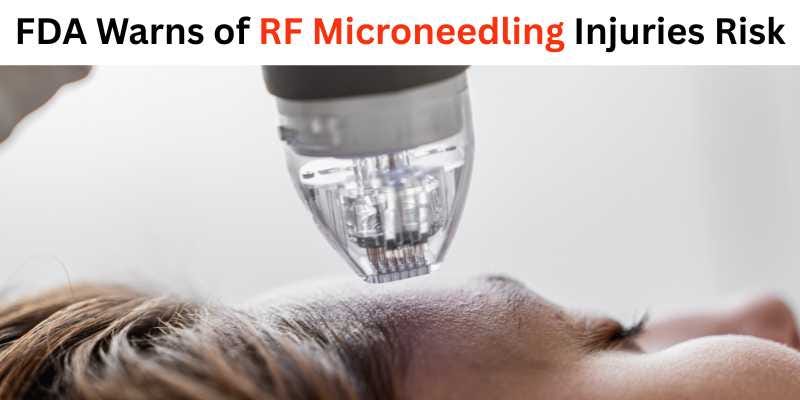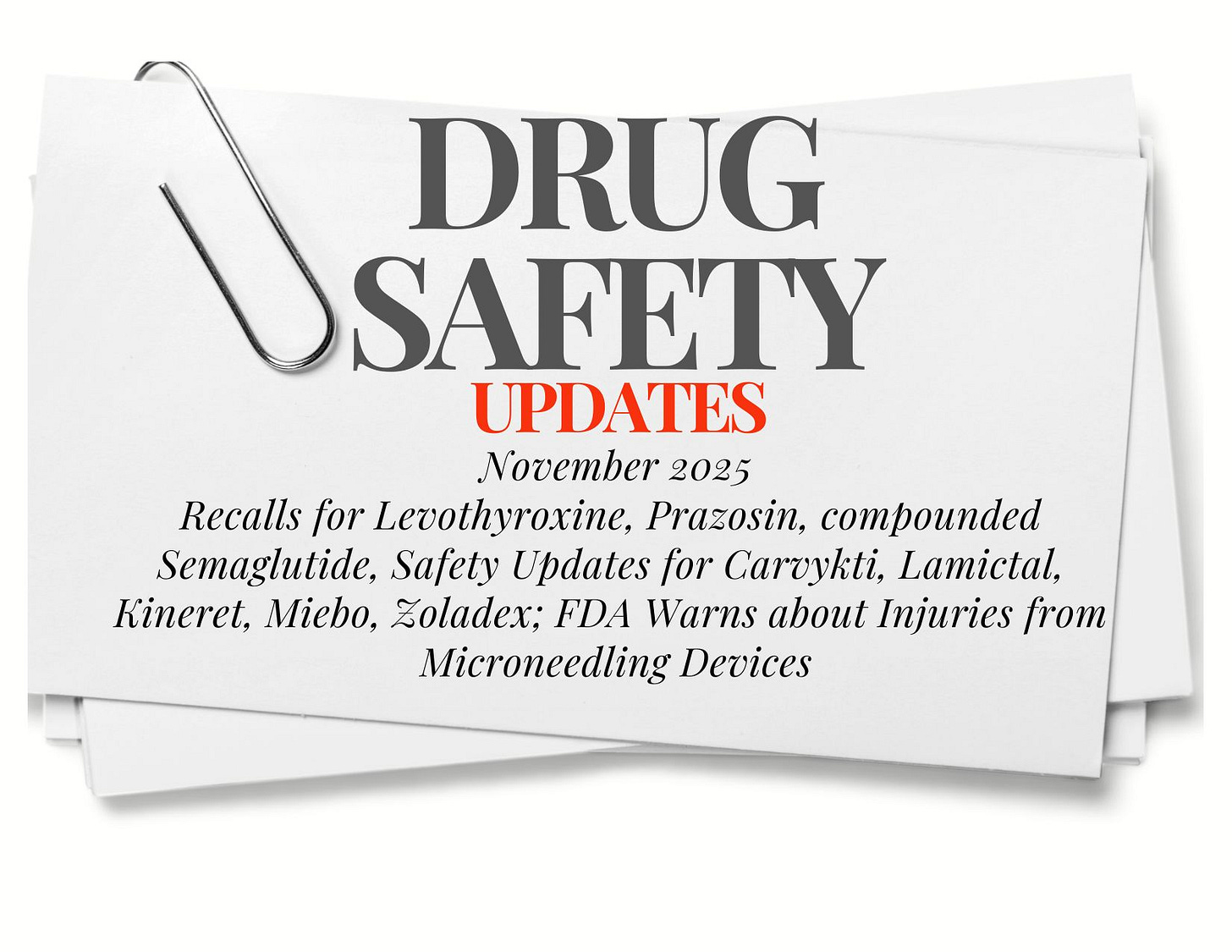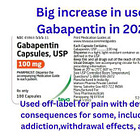November 2025 Drug Safety: Recalls for Compounded Semaglutide, Generic Synthroid; Safety Updates for Lamictal, Kineret, Miebo Eye Drops, Zoladex; Microneedling Injuries, more
Concerns about Industry-Funded Studies for GLP-1s
No doubt about it, GLP-1 drugs like semaglutide and tirzepatide can help you lose weight by mimicking natural hormones that slow digestion and help you feel full for long periods of time. But three new Cochrane reviews on the effects of these drugs on adults with obesity raise concerns about long-term outcomes, side effects, and conflicts of interest from industry-funded studies. Semaglutide (18 studies), tirzepatide (9 studies), and liraglutide (24 studies) were separately examined. The reviews were commissioned by the World Health Organization as part of its efforts to provide guidelines for the use of GLP-1 medications.
Cochrane Review: “GLP-1 drugs effective for weight loss, but more independent studies needed”
Recall of Compounded GLP-1s
ProRx, of Exton, Pennsylvania, is recalling more than 36,000 multidose 1 to 5 mL vials of compounded semaglutide of various strengths that were distributed in Texas and Utah. In addition, it is recalling 2,761 3 mL vials of compounded tirzepatide. The reason for the recall is a lack of assurance of sterility. The recall is directed at suppliers, but consumers may wish to check the recall link for affected lot numbers. Earlier this year, ProRx received a warning letter from the FDA after a facility inspection and in 2024, ProRx recalled 15,000 vials of semaglutide.
FDA Recall Announcement
MedShadow Foundation: More about Compounded GLP-1 Recalls and Compounding Pharmacies Safety and Misleading Marketing of Compounded GLP-1s
Levothyroxine Sodium Tablets (Synthroid generic) Recall by Accord Healthcare
Accord Healthcare is recalling 54,432 bottles of Levothyroxine Sodium Tablets, 88 mcg (90-count bottles), due to subpotency (less than the required amount of active ingredient) discovered during long-term stability testing. The tablets were manufactured by Intas Pharmaceuticals Limited in Selaqui, India. Levothyroxine is generic for Synthroid and treats hypothyroidism. The recall is directed at suppliers, but consumers may wish to check the recall link for affected lot numbers.
FDA Recall Announcement
Prazosin (Minipress generic) Recall by Teva
Teva Pharmaceuticals USA is recalling over 580,000 bottles of blood pressure drug Prazosin Hydrochloride capsules in 1 mg, 2 mg, and 5 mg strengths. Testing revealed levels of nitrosamine, a carcinogenic impurity, above the FDA-allowed limits. Prazosin is generic for hypertension drug Minipress, and is also used off-label to treat symptoms of post-traumatic stress disorder, including nightmares and sleep disturbances. The recall is directed at suppliers, but consumers may wish to check the recall link for affected lot numbers.
FDA Recall Announcement
Related recall of Prazosin: American Health Packaging Recall
More about nitrosamine from FDA: Information about Nitrosamine Impurities in Medications
Check our website for briefs on additional recent recalls of Atorvastatin, Fasenra, and Gabapentin, and more.
Carvykti Boxed Warning Update
Janssen’s T-cell therapy for multiple myeloma (a type of blood cancer), Carvykti (ciltacabtagene autoleucel injection, suspension for intravenous administration) had its Boxed Warning updated to warn of the risk of a life-threatening condition called immune effector cell-associated enterocolitis (IEC-EC). Cases of IEC-EC have been reported since the drug was approved in 2022.
Patients with IEC-EC have symptoms including severe or prolonged diarrhea, abdominal pain, and weight loss requiring total parenteral (feeding tube) nutrition and treatment with various immunosuppressive therapies, including corticosteroids. In reports, IEC-EC occurred weeks to months following infusion.
In spite of the newly identified risks, the FDA has determined that the overall benefit of Carvykti continues to outweigh the potential risks for approved use, including overall survival benefit in patients treated with Carvykti. Each dose is customized using a patient’s own T-cells, which are collected, genetically modified, and then infused back into the patient.
FDA Announcement on Carvykti
Oncology Nursing Society: ONC Voice: FDA Approves Boxed Warning
Kineret (Anakinra) and Injection Site Reactions
Rheumatoid arthritis (RA) drug Kineret (Anakinra) had a label update to warn that cases of injection site amyloid deposits (build-up of abnormal proteins) have been reported in patients after receiving high doses of Kineret injected subcutaneously into the same area of skin over long periods of time. Patients are advised to rotate the injection site and to avoid injecting into an area that is already swollen or red. Patients with confirmed injection site amyloid deposits should be monitored for systemic amyloidosis; this happens when the protein deposits happen throughout the body’s organs and tissues. Kineret was approved in 2001.
Kineret Safety Label Update
Read more about amyloidosis at MedLine Plus or Cleveland Clinic.
Read Patient Experiences with Kineret and check out our new MedWatch Safety Summary for Kineret derived from adverse event reports submitted directly to the FDA by patients, physicians, and other health professionals.
Lamictal (lamotrigine) and Serious Skin Rashes
Lamictal’s boxed warning was updated to warn that people of certain Asian ancestry with the HLA-B*1502 allele have a genetic propensity for an increased risk of life-threatening skin rash, including Stevens Johnson Syndrome. Other factors also increase the risk of serious skin hypersensitivity reactions, but cases have occurred in the absence of these factors. Lamictal treats epilepsy and bipolar disorder. It was approved in 1994.
Lamictal Safety Label Update
MIEBO (perfluorohexyloctane) Eye Drops Safety
Dry eye treatment MIEBO (perfluorohexyloctane ophthalmic solution) had its label updated to warn of hypersensitivity reactions that were reported in pre-marketing clinical trials. Those with hypersensitivity to perfluorohexyloctane should avoid using Miebo. Miebo eye drops are applied four times a day. The drug was approved in 2023.
Miebo Safety Label Update
Related News about Miebo: Stat reports that Bausch & Lomb’s Miebo, which sells for $800 a month (before insurance) in the U.S., has been sold over-the-counter as EvoTears in Europe since 2015 and costs only about $20. Reporter David Maris observes that “finding a way to get an existing European OTC drug to be a prescription drug in the U.S. with a new name and a 40-fold price increase is not true innovation — it’s a price-gouging strategy.”
Stat: “A $20 over-the-counter drug in Europe requires a prescription and $800 in the U.S.”
Do these eye drops work for you? Worth the cost? Please take a few seconds to rate it at Ask a Patient using this form: Add a rating for Miebo
So far, 48 MedWatch reports have been filed since it was approved in late 2023, with 40 of the reports submitted by women.
Tezspire Subcutaneous Injection for Nasal Polyps: New Safety Information
In conjunction with its expanded approval as an add-on maintenance treatment for chronic sinus infection with nasal polyps for age 12 and up, AstraZeneca’s Tezspire (tezepelumab-ekko) had a safety label update to provide related clinical trials results and updated side effects information. Newly listed common side effects include: common cold symptoms, upper respiratory tract infections, nose bleeds, flu, and injection site reactions. Tezspire was approved in 2021 as an add-on maintenance treatment for severe asthma.
Tezspire Safety Label Update
Zoladex (goserelin implant) Subcutaneous Injection and Risk of Stevens Johnson Syndrome
Prostate and breast cancer drug Zoladex had a safety label update to warn of the risk of severe cutaneous adverse reactions (SCARs), including Stevens-Johnson syndrome/toxic epidermal necrolysis. Zoladex 3.6 mg is used to treat women diagnosed with breast cancer, endometriosis, and dysfunctional uterine bleeding, as well as to treat men with prostate cancer. Zoladex 10.8 mg is used to treat men with prostate cancer. Zoladex was approved in 1996.
Zoladex Safety Label Update
Read more about Stevens-Johnson syndrome at Medline Plus.
Read Patient Experiences with Zoladex
FDA Announces New Safety Warning for Radiofrequency (RF) Microneedling Devices
In a safety communication, the FDA warned about the risk of serious side effects from procedures using radiofrequency (RF) microneedling devices, which are marketed for facial wrinkles, abdominal scars, or acne scar improvement . The devices are often used at dermatology or med spa types of facilities. The FDA learned about device-linked injuries and side effects from reports it has received from patients and manufacturers and also from comments found on social media web sites.
RF microneedling devices have been linked to burns, hypersensitivity, scarring, fat loss, and nerve damage. FDA states that RF microneedling should only be performed by trained medical professionals, never at home. Patients considering such procedures should discuss potential risks and benefits with their doctor and make sure the provider has proper training and experience with using the device.
Patients experiencing complications should contact their healthcare provider and are also encouraged to report the problem to the FDA using the voluntary MedWatch reporting system.
FDA Safety Communication: “Potential Risks of Certain Uses of Radiofrequency RF Microneedling”
The FDA announcement may affect the consent obligations for providers of the treatments. This law firm, for example, recommends that facilities update their consent forms with the new risks.
Holt Law: FDA issues urgent warning on RF Microneedling New Risks; How to Protect Your MedSpas Liability
Some “microneedling” devices are NOT considered medical devices and are not regulated by the FDA and so don’t pose the risks described in the safety communication. These products don’t deeply penetrate the skin and instead help exfoliate the skin. Read this FDA guidance that explains the differences in microneedling devices and provides safety tips:
FDA: “Microneedling Devices: Getting to the Point on Benefits, Risks and Safety”

Did you miss the last edition of the newsletter? Please read it here:
Would you like to comment on this article that you received by email - but you’re not a Substack member? Just simply reply to this email and I will get your message. (No one else will!) In particular, if you know of useful articles with medication tips you’d like to share or topics you would like covered, let me know. Thank you.



The Cochrane review timing is notable given WHO's guideline process, and the conflict of interest concern is real when you consider the rapid uptake without long term data. The compounding recall highlights why FDA shortage declarations carry such downstream risks, quality control at these smaller pharmacies is inherently less robust. What's intersting is that the recalls aren't stopping demand, patients are still seeking compounded versions despite the safety signals. The industry funded study problem isn't unique to GLP-1s but the stakes are higher given the potential scale of chronic use across millions of patients.